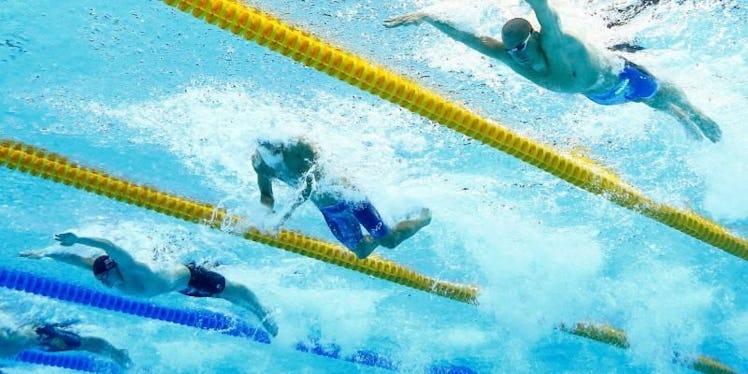
Conspiracy Theory Says Olympic Pool Gave Unfair Advantage To Certain Swimmers
Just when you thought the Ryan Lochte robbery scandal was going to be the biggest story to come out of the 2016 Summer Olympics in Rio, news breaks about an Olympic pool conspiracy theory.
According to a report published by The Wall Street Journal, a current in the Olympic pool in Rio could be responsible for giving an unfair advantage to half of the athletes who competed in the 50m competitions.
A disturbing question is arising about the 50-meter Olympic freestyle https://t.co/Xd0w0j0ZKT — Wall Street Journal (@WSJ) August 17, 2016
The report suggests swimmers in lanes five through eight had a distinct advantage over swimmers in lanes one through four when it came to the one-way race.
Three scientists, led by Joel Stager, director of Indiana University's Counsilman Center for the Science of Swimming, published a report suggesting a current favored swimmers in the higher-numbered lanes, and they have the numbers to prove it.
According to The Wall Street Journal, of the eight Olympic swimmers who recorded fast enough times in the 50m semis to reach the final, seven swam in lanes four through eight.
As further evidence to suggest such a current existed in Rio, it appears many of those same swimmers who moved to lanes one through four for later races posted slower finish times.
Speaking on his team's findings, Joel Stager reportedly said,
It's a big deal. This is horrific.
FINA, swimming's global governing body, is reportedly reviewing these findings.
It appears this isn't the first time a current has been present in a competition and caused skewed results. Stager and his team reportedly found evidence of a similar occurrence a the 2013 world championships in Barcelona.
Myrtha Pools constructed the pools for the 2013 world championships and the Olympics in Rio. Speaking on this troubling report, the chairman of the board for Myrtha Pools USA reportedly said,
We were required to do tests to show that there was no movement of water, and the tests were conclusive that there was no movement of water. If we saw there was a current, we'd have done something about it. There was no indication whatsoever.
A paper published in the Journal of Sports Sciences examined the results of 17 different swimming competitions from 2000 to 2013, and the results appear to show that in pools constructed for specific events, like the Rio Olympics, a specific bias existed in certain lanes based on race times.
Apparently, the IOC didn't respond to the Journal's request for a comment, and I cannot say I blame them.
You know Ryan Lochte is answering questions today, like, "You guys here about the current in lane six?"
Citations: Did the Olympic Pool Give Some Swimmers an Advantage? (The Wall Street Journal)